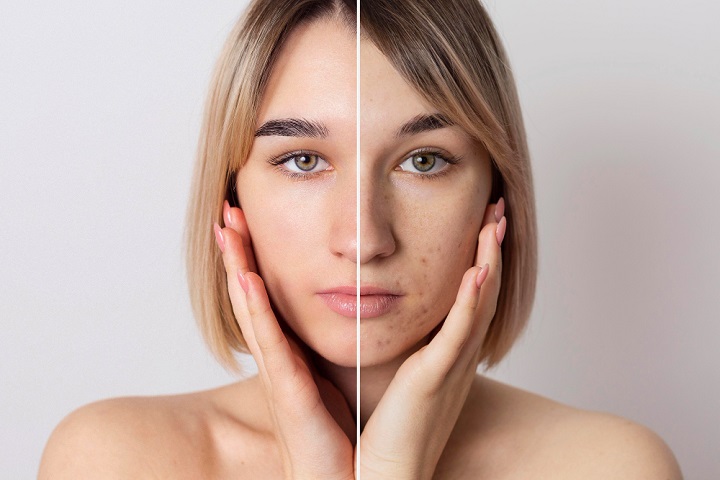Understanding Acne
Acne, scientifically known as Acne Vulgaris, is a skin condition that originates in the hair follicles when they become clogged with sebum and dead skin cells. Sebum is an oily substance secreted by sebaceous glands, and when it mixes with dead skin cells, it can cause blockages leading to blackheads, whiteheads, pimples, or in severe cases, cysts or nodules.
The Impact of Acne on Quality of Life
Beyond the physical discomfort and possible scarring, the psychological impact of acne can be profound. Studies have shown a correlation between acne and increased risk of depression, anxiety, and reduced self-esteem. This emotional toll emphasizes the importance of effective treatment and control strategies.
Root Causes of Acne
Hormonal Changes
Hormonal acne occurs when fluctuations in hormones, such as testosterone and estrogen, stimulate the overproduction of sebum. This is why acne is common during puberty, but can also appear during menstruation, pregnancy, or periods of stress, which are known to trigger hormonal imbalances.
Diet and Lifestyle Factors
Emerging research has linked certain dietary factors to acne development. High-glycemic-index foods, dairy products, and diets rich in omega-6 fatty acids may contribute to acne. In addition, factors like stress, lack of sleep, and poor hygiene can aggravate the condition.
Genetic Factors
Just like many other health conditions, if your parents had acne, there’s a higher chance you’ll have to deal with it too. This doesn’t mean it’s inevitable, but genetic predisposition plays a role in your likelihood of developing the condition.
Exploring Acne Treatments
The Role of Dermatologists
Dermatologists play a pivotal role in the treatment of moderate to severe acne. They can diagnose the type and severity of acne and prescribe treatments accordingly. Prescription medications might include oral contraceptives, antibiotics, or in extreme cases, isotretinoin.
Over-the-Counter Acne Treatments
For less severe cases, over-the-counter acne treatments can be highly effective. These products often contain benzoyl peroxide, salicylic acid, or sulfur, which work by reducing inflammation, killing bacteria, and unclogging pores.
The Power of Acne Control Serum
What is an Acne Control Serum?
An acne control serum is a skincare product designed to deliver high concentrations of active ingredients directly to the skin. The unique, lightweight formulation allows it to penetrate more deeply than traditional creams or lotions, delivering targeted treatment right where it’s needed most.
The Benefits of Using a Serum
Serums are typically rich in antioxidants, anti-inflammatories, and hydrating ingredients. The high concentration of active ingredients can help soothe inflammation, unclog pores, and repair skin damage more effectively than many other forms of skincare.
Unmasking the Magic of Vitamin C Serum for Acne
Vitamin C – A Powerful Antioxidant
Vitamin C, or ascorbic acid, is a potent antioxidant that helps protect the skin from environmental stressors like pollution and UV damage. By neutralizing free radicals, it prevents oxidative stress, a key factor in acne development. Moreover, it has anti-inflammatory properties that can help reduce the redness and swelling associated with acne lesions.
How Vitamin C Serum Helps Combat Acne
Vitamin C can help fade post-acne scars and improve skin texture by promoting collagen synthesis, a critical process for skin repair and renewal. By speeding up cell turnover, it can also help to unclog pores and prevent future breakouts.
Choosing the Right Vitamin C Serum for Acne
Ingredients to Look for
When choosing a vitamin C serum for acne, seek out one that also includes other skin-nourishing ingredients. Hyaluronic acid for hydration, vitamin E for additional antioxidant power, and ferulic acid to stabilize the formula can all enhance the benefits of your serum.
The Importance of the Correct Formulation
Different forms of vitamin C can have different levels of potency and efficacy. For instance, L-ascorbic acid is highly effective but can be irritating for some skin types, while other forms like magnesium ascorbyl phosphate are more stable and less likely to cause irritation.
Tips to Incorporate Vitamin C Serum into Your Skincare Routine
Always perform a patch test when introducing a new product. If there’s no adverse reaction, you can begin to incorporate the serum into your daily routine. Apply it after cleansing but before moisturizing for optimal absorption. And remember, consistency is key in skincare – regular, prolonged use will yield the best results.
Conclusion
Acne can be a tough adversary, but with understanding and the right tools in your skincare arsenal, it’s a battle that can be won. A well-formulated acne control serum can be a formidable ally, helping not just to control active acne, but to repair and protect your skin for the future. So gear up, stay consistent, and reclaim the health and beauty of your skin!





